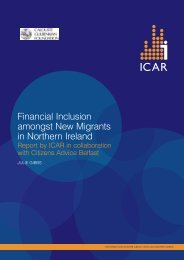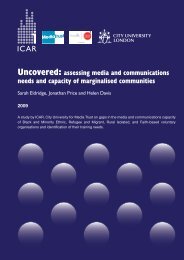The Somali community in the UK: What we know and how we ... - ICAR
The Somali community in the UK: What we know and how we ... - ICAR
The Somali community in the UK: What we know and how we ... - ICAR
You also want an ePaper? Increase the reach of your titles
YUMPU automatically turns print PDFs into web optimized ePapers that Google loves.
Although operat<strong>in</strong>g <strong>in</strong> a very different context,<br />
where <strong>the</strong> mean<strong>in</strong>g assigned to clan is subject to<br />
a process of change, clanship <strong>in</strong> <strong>the</strong> <strong>UK</strong> <strong>in</strong>volves<br />
similar complexities, <strong>and</strong> analysis is fraught with<br />
pitfalls. In his study of <strong>Somali</strong> refugees <strong>in</strong> London,<br />
Griffiths (2002: 94-125) emphasises <strong>the</strong> factors<br />
affect<strong>in</strong>g <strong>the</strong> significance of clan <strong>in</strong> <strong>in</strong>dividual lives<br />
- gender, age, <strong>and</strong> class among <strong>the</strong>m, to which may<br />
be added personal details such as education, war<br />
experience, previous country of domicile, <strong>and</strong> so<br />
on. 151 While those from a rural background may be<br />
more tightly l<strong>in</strong>ked to clan networks, urbanites may<br />
have had more experience of clan factionalism <strong>in</strong><br />
daily life. <strong>What</strong>ever <strong>the</strong>ir previous experience, every<br />
<strong>Somali</strong> will not only <strong>know</strong> <strong>the</strong>ir own clan affiliation,<br />
but those of o<strong>the</strong>rs.<br />
<strong>The</strong> implications of conflict <strong>and</strong> support also arise.<br />
Co-clan members have an obligation to help a new<br />
arrival, <strong>and</strong> clan membership can provide a readymade<br />
network of assistance, both <strong>in</strong>formal <strong>and</strong><br />
organised <strong>in</strong> <strong>community</strong> centres <strong>and</strong> associations.<br />
But for some of <strong>the</strong> older generation, memories of<br />
<strong>in</strong>terclan hostility, fuelled by rumours of <strong>the</strong> <strong>Somali</strong><br />
scene, also prevent co-operation with members<br />
of certa<strong>in</strong> o<strong>the</strong>r clans. El Solh (1991) argues that<br />
<strong>in</strong> To<strong>we</strong>r Hamlets, o<strong>the</strong>r markers of identity have<br />
been subsumed under clanship which has been<br />
reactivated <strong>in</strong> <strong>the</strong> refugee <strong>community</strong>. Griffiths<br />
found that <strong>the</strong> progression of <strong>the</strong> <strong>Somali</strong> war<br />
assumes much greater importance <strong>in</strong> <strong>the</strong>ir lives<br />
than local east London events (2002: 97). But it is<br />
important not to generalise from specific contexts.<br />
Both <strong>the</strong>se researchers <strong>we</strong>re ma<strong>in</strong>ly speak<strong>in</strong>g to<br />
Isaaq, who fled dur<strong>in</strong>g <strong>the</strong> 1980s from <strong>the</strong> terror<br />
<strong>in</strong>flicted by Barre’s Darod-dom<strong>in</strong>ated forces, <strong>and</strong><br />
made for <strong>the</strong> London area of longst<strong>and</strong><strong>in</strong>g Isaaq<br />
settlement. Contemporary arrivals from <strong>the</strong> south<br />
travell<strong>in</strong>g via o<strong>the</strong>r po<strong>in</strong>ts <strong>in</strong> <strong>the</strong> diaspora have had<br />
a different history <strong>in</strong> relationship to particular clan<br />
aggression, <strong>and</strong> although <strong>Somali</strong>s will travel across<br />
London to meet<strong>in</strong>g po<strong>in</strong>ts of co-members, <strong>the</strong><br />
London boroughs with <strong>Somali</strong> populations conta<strong>in</strong><br />
members of various clans.<br />
Some young <strong>Somali</strong>s have, ho<strong>we</strong>ver, <strong>in</strong>herited clan<br />
hostility from <strong>the</strong>ir parents. Alex McBride (2003)<br />
reports on <strong>the</strong> gang violence <strong>in</strong> Woolwich, east<br />
London, which flares up not only bet<strong>we</strong>en <strong>Somali</strong>s<br />
<strong>and</strong> African Caribbeans, but also bet<strong>we</strong>en <strong>Somali</strong>s<br />
of different clans. But o<strong>the</strong>r <strong>Somali</strong> youth, especially<br />
those born <strong>in</strong> <strong>the</strong> <strong>UK</strong> or brought here at an early<br />
age, express impatience with this preoccupation of<br />
<strong>the</strong>ir elders. A <strong>Somali</strong> identity, based on religion <strong>and</strong><br />
<strong>the</strong> mo<strong>the</strong>r country of <strong>the</strong>ir parents, is important<br />
to <strong>the</strong>m, as is <strong>the</strong> family - but family as <strong>in</strong> <strong>the</strong><br />
extended unit of <strong>know</strong>n relatives, not <strong>the</strong> more<br />
abstract co-membership of clan. <strong>The</strong> clan elders,<br />
<strong>the</strong>y say, are out of touch with <strong>the</strong> reality of young<br />
people’s lives - a decl<strong>in</strong>e <strong>in</strong> authority that Griffiths<br />
(2002: 123-124) connects to <strong>the</strong> loss of male<br />
status <strong>in</strong> <strong>the</strong> home. Yet <strong>the</strong>re is still evidence of <strong>the</strong><br />
persistence of <strong>the</strong> peacemak<strong>in</strong>g role of elders, such<br />
as <strong>in</strong> settl<strong>in</strong>g matters bet<strong>we</strong>en <strong>the</strong> rival Woolwich<br />
gangs, so avoid<strong>in</strong>g <strong>the</strong> British courts (McBride,<br />
2003). This type of action would re<strong>in</strong>force <strong>the</strong><br />
op<strong>in</strong>ion of some young <strong>Somali</strong>s that clan loyalties<br />
are relevant only as a re<strong>in</strong>forcement of mutual<br />
support <strong>and</strong> solidarity. <strong>The</strong>y dismiss <strong>the</strong> antagonistic<br />
element <strong>in</strong> clanship as ‘ignorance’ <strong>and</strong> ‘nonsense’,<br />
<strong>and</strong> reject researchers’ emphasis on <strong>the</strong> relevance<br />
of clan as ‘out of date’. <strong>The</strong>re are also many <strong>Somali</strong><br />
refugees <strong>in</strong> <strong>the</strong> <strong>UK</strong> of all ages who resist notions<br />
of clan exclusivity <strong>and</strong> conflict. As one said to<br />
Nurudd<strong>in</strong> Farah: “In <strong>Somali</strong>a…. I am born <strong>in</strong>to a<br />
clan. In Brita<strong>in</strong>, I am a <strong>Somali</strong>” (2000: 109).<br />
How far clan rema<strong>in</strong>s a potent symbol <strong>in</strong> <strong>the</strong><br />
psyche of <strong>Somali</strong> refugees, <strong>and</strong> <strong>the</strong> extent to<br />
which it takes on new mean<strong>in</strong>g <strong>in</strong> <strong>the</strong> diaspora,<br />
will depend both on <strong>the</strong>ir experience of <strong>the</strong> <strong>UK</strong>,<br />
<strong>and</strong> political developments <strong>in</strong> <strong>Somali</strong>a. Successful<br />
settlement <strong>in</strong> <strong>the</strong> <strong>UK</strong> will <strong>we</strong>aken l<strong>in</strong>ks to ‘home’,<br />
<strong>and</strong> encourage identities founded on local<br />
connections ra<strong>the</strong>r than natal affiliations. If<br />
recent attempts to re-found a <strong>Somali</strong> nation state<br />
progress, this may encourage dreams of return,<br />
but to a society where clan is not <strong>the</strong> determ<strong>in</strong><strong>in</strong>g<br />
factor <strong>in</strong> public <strong>and</strong> private careers.<br />
<strong>What</strong>ever <strong>the</strong> objective conditions <strong>in</strong> <strong>the</strong> <strong>UK</strong><br />
or <strong>the</strong> Horn of Africa, it will still be impossible<br />
to generalise as to <strong>the</strong> persistence of a clan<br />
ideology amongst <strong>Somali</strong>s. As has been repeatedly<br />
emphasised throughout this report, <strong>the</strong>y are not a<br />
homogenous group, <strong>and</strong> factors of gender,<br />
151. See also Griffiths (1997).<br />
<strong>The</strong> <strong>Somali</strong> <strong>community</strong> <strong>in</strong> <strong>the</strong> <strong>UK</strong><br />
69

















